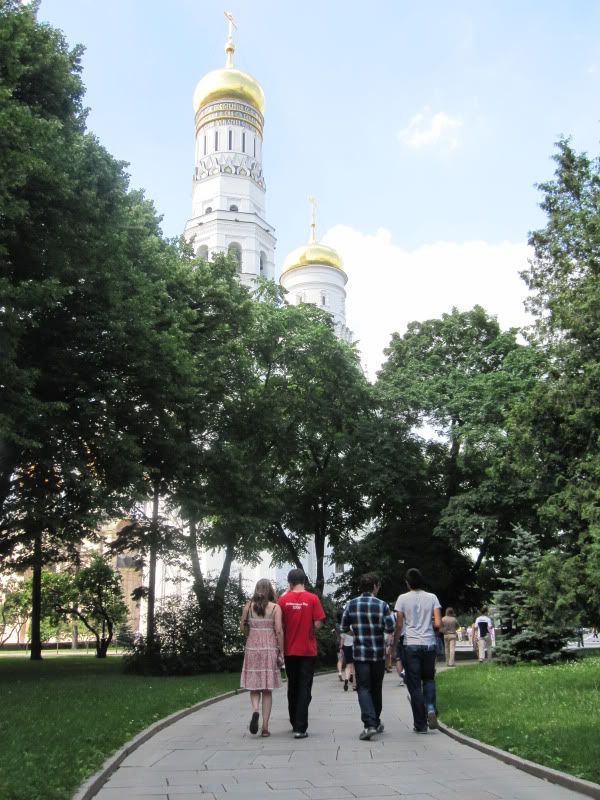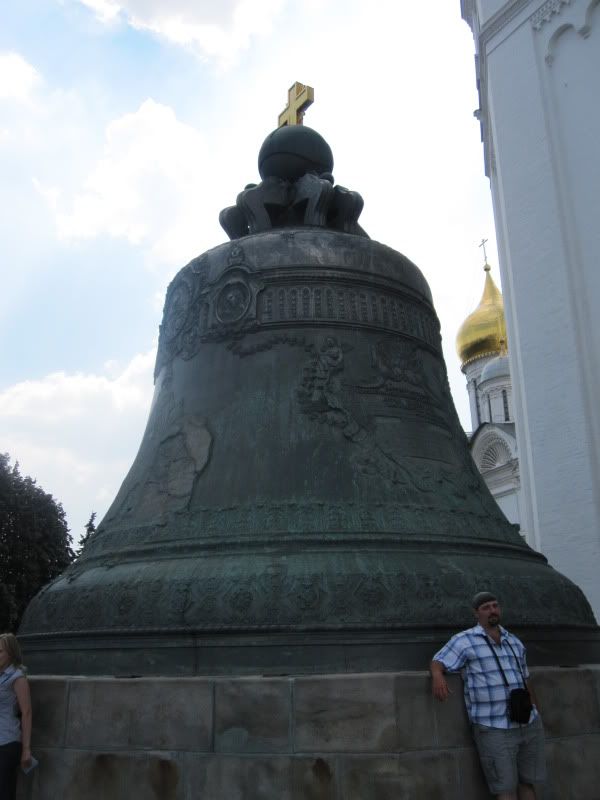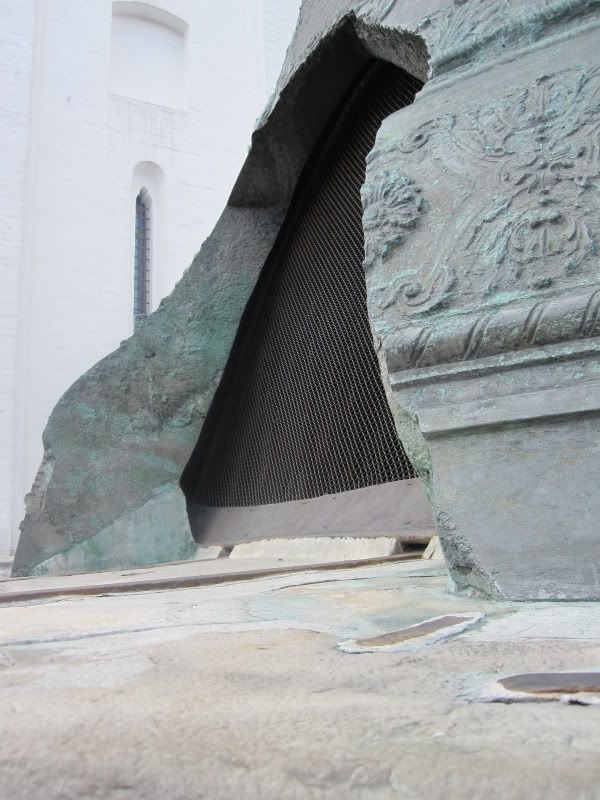(Note: all photos in this post were taken by me when I visited the Kremlin in July 2010. Click to see larger versions.)
Taking a break from researching/writing a speech about the American justice system for the Yale Political Union's Gardner-White Prize Debate on R: Bring back the stocks tonight. In between skimming Gresham Sykes's The Society of Captives and wading through the Bureau of Justice Statistics's Survey of Sexual Violence, I've been going through my music library looking for songs about prisons, criminals, gangs, etc. Of course ended up listening to one of my top five Tom Waits songs, "Hoist that Rag", and a certain line caught my attention in a new way:
(I can never resist posting live performances, but you can hear the studio version, which is brilliant and perhaps more palatable to less seasoned Waits fans, here.)
"Well, we stick our fingers in the ground,heave and turn the world around.
Smoke is blacking out the sun,
at night I pray and clean my gun.
The cracked bell rings as the ghost bird sings;the gods go begging here.
So just open fire when you hit the shore,all is fair in love and war."
I've listened to this song probably at least a hundred times, but this time the image of the cracked bell caught me and reminded me of Leonard Cohen's "Anthem" (which I heard for the first time a few weeks ago, courtesy of the Ochlophobist):
"So, ring the bells that still can ring,forget your perfect offering.There is a crack in everything,that's how the light gets in."

New Haven, where I've lived for nigh four years now, is full of the noise of bells, from the widely hated carillon in Harkness Tower to the more modest Christ Church bells, rung before Compline on Sundays. Bells have in their call an unnerving mix of the joyful and the ominous, every peal containing within it the calm foreboding of Gust Avrakotos's Zen master in Charlie Wilson's War: we'll see, we'll see, we'll see, yes, yes, we will see.
"The weak sounds of wood and metal remind us of the unclear, mysterious words of the prophets, but the loud and vigorous play of bells is like the rejoicing of the Gospel, radiating out to all corners of the universe and lifting one's thoughts to the angelic trumpets of the last day."(note: don't have access to the book I got this from at the moment, will cite source later)
"The bell played an important part in material as well as spiritual culture through its technological tie-in with the manufacture of cannon. Already by the late fourteenth century--only a few years after the first appearance of cannon in the West--Russians had begun to manufacture cannon along with bells; and, by the sixteenth century, they had produced the largest of each item to be found anywhere in the world...

They represent the first example of 'overtaking and surpassing' a superior technology. But they illustrate as well the artificiality of of the accomplishment. For the bell was too large to hang, the cannon too broad to fire."- James Billington, I&A
Not only was the Tsar'-kolokol (Tsar-bell), as it was called, too large to hang, but it in fact cracked while it was still being cast. During a massive fire in 1737, cool water was thrown onto the bell while in the casting pit to prevent it from melting-- the sudden temperature change left us with the bell you see below.

So then: cracked bells, how do they work (as symbols fraught with theological, historical, and literary significance approaching the self-indulgently gravid in these three distinct, unrelated, and arbitrarily selected contexts)?
First we have this Waitsian image signalling perversion of the natural order, both summoning us to, and heralding our arrival at, the Absurd, the Surreal-- "The Lowside of the Road", as Tom himself might put it (which, incidentally, is also the title Barney Hoskyns chose for his unauthorized TW biography). "Lowside" was released on 1999's Mule Variations, five years before Real Gone and "Hoist that Rag". Think of the darkest, most inscrutable moments in O Brother, Where Art Thou? "Lowside" not only describes that world, but makes us realize we've been there too, and might be there still.
"The moon is red and you're dancin' real slow,
twenty-nine miles left to go.
The chain monkeys help you with your load,
you're rollin over to the lowside of the road."
...
Well the clapper has been ripped out of the bell,
The flapper has been kicked right out of hell.
When the horse whips the man that he rode,
you're rollin over to the lowside of the road."
Again: soundless bells announcing the unexpected, the contrary, the impossible: "the gods go begging here," "the flapper has been kicked right out of hell".
Cohen, despite imploring us to acknowledge our inescapable imperfection, seems to present a much brighter vision, one that echoes in its simplicity and joy the bells of early Rus', or perhaps the end of Gogol's Dead Souls: "Where art thou soaring away to, Russia? Give me the answer! But Russia gives none, save the bell pouring forth marvelous sound..."
But here I think the reality of the Tsar-bell links Cohen and Waits: intended to signal to the world the strength, expertise, and piety of "the New Jerusalem", it was undone by nothing grander than one of the basic elements. It stands both as an impressive monument and a humbling castigation-- it is an absurdity, a paradox, a thing both of beauty and of shame. Like the maimed bells of "Lowside" and "Hoist that Rag", it reminds us that we are in a world beyond our comprehension, and like the one beginning Cohen's "Anthem", it assures us that our feckless, discordant acts of worship are loved nevertheless.
Photo 1: Колокольня Ивана Великого/Ivan the Great Bell Tower
Photo 2: Царь-колокол/Tsar-bell
Photo 3: The giant crack in the Tsar-bell



Great post, thanks
ReplyDelete